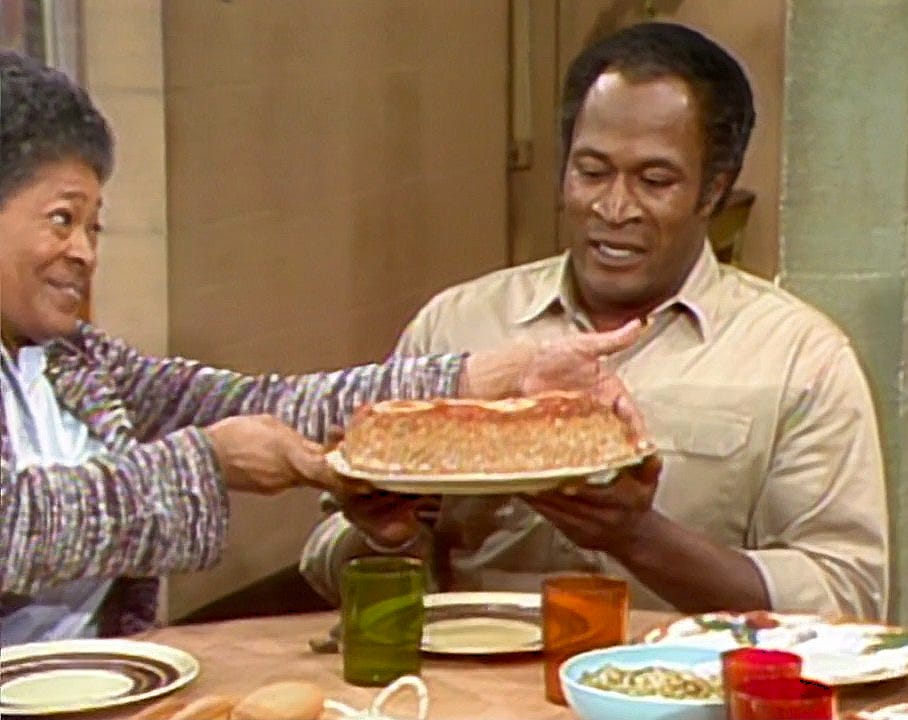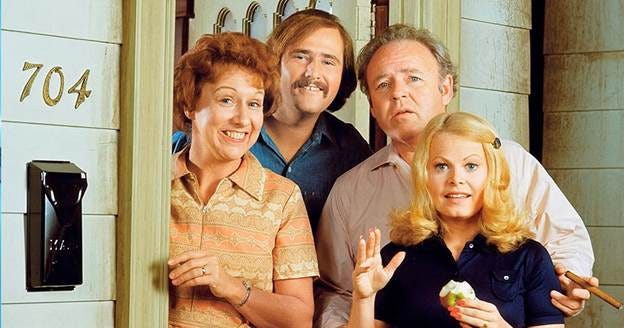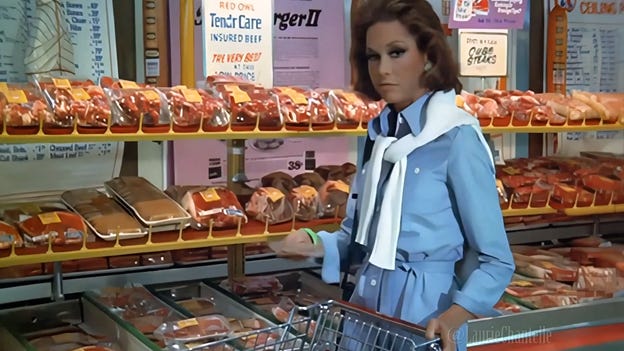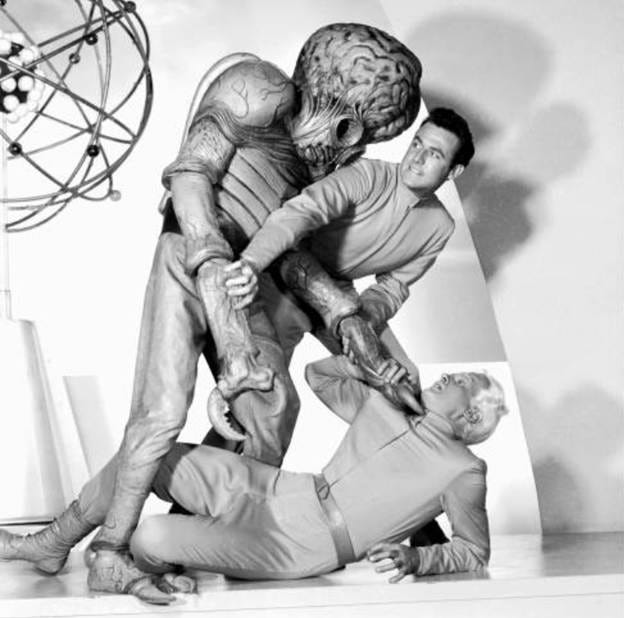Read trash; watch sitcoms.
Why light entertainment is essential in heavy times
“I guess somehow, the world seems like a nicer place when you don't know what's going on in it.” - Michael Harris, Newhart
In the 1970s, times were tough all over. Inflation and unemployment were through the roof, gas prices skyrocketed, and the White House was marred by scandal. People were poor, tired, depressed, and scared. They didn’t know how they were going to feed their families. Senior citizens were resorting to eating pet food. The outlook was bleak.

Yet, throughout this dismal, dreary, destitute decade, the highest rated television shows in the US were sitcoms.
All in the Family dominated the first half of the ‘70s, consistently coming in at number one in the ratings.

In the second half, Laverne & Shirley and Happy Days tag-teamed the top two slots. Meanwhile, Sanford and Son, Maude, Rhoda, and Three’s Company stayed solidly in the top 10.
In one of the darkest economic periods in US history, people needed a laugh.
No matter how bad the real world got, how long they had to wait in line to fill up their gas tanks, how long they were unemployed, or how high the price of meat soared, the Americans of the ‘70s knew that at the end of the day, they could step out of reality and enter the happy world of TV Land, where beloved characters got into silly situations and made them feel good for a few precious hours.

In TV Land, people could forget about the news, their empty bank accounts, and their empty stomachs. They could stop thinking period, and just allow themselves to be entertained.
Sitcoms brought a little sanity to an insane world.
The rise of the sitcom in the US started in the mid-1960s, when they replaced westerns as America’s favorite TV genre. They surged in the ‘70s and remained popular throughout the ‘80s and ‘90s, but in the 2000s, something changed.
There was a massive shift in top-10 ratings from light-hearted sitcoms to vapid reality shows, offbeat game shows, weighty dramas, and football. Lots and lots of football.
While a few odd sitcoms managed to eke their way into the top 20, like Modern Family, The Big Bang Theory and its spin-off, Young Sheldon, and How I Met Your Mother, they were greatly outmatched by shows that were emotional, unscripted, and sports-centered.
For some reason, Americans no longer wanted to escape to TV Land; they wanted to return to reality.
This was widely regarded as a bad move, but it was too late to turn back.
The reality trend continued throughout the 2000s and 2010s, leaving TV viewers with little to watch that wasn’t some spin-off of Survivor (or people talking about Survivor) and five days a week of Who Wants to be a Millionaire? and American Idol, all of which, while certainly mindless, did not have the same mood‑boosting effect as sitcoms.
In the 2020s, suddenly things started to suck again. Inflation and unemployment rose sharply, mass shootings and COVID were killing people by the dozens, and depression hit an all-time high.
For the first time in 50 years, we are now getting a taste of the economic, political, and emotional instability people suffered in the ‘70s.
And it’s only getting worse.
Yet, through all this turmoil, what are we watching? Drama. Tons of serious drama peppered with the occasional depressing documentary.
We eat up sweeping dramatic themes with high-minded opinions on modern society. We unashamedly binge-watch true crime shows, reeling at the seemingly endless objectionable things people willingly do to each other. We even dutifully watch and read dystopian nightmares with the certain knowledge that we are quickly descending into one in real life.
What are we doing to ourselves?
All day long, the news is nothing but man’s inhumanity to man, and we can’t even relax and unwind with some feel-good comedy. Why?
There’s a pervasive attitude in our society that looks down on pure entertainment for entertainment’s sake. Anything without a deep message or overt social commentary is considered junk.
Publishers don’t want so-called “speculative” or “genre” fiction like romance, fantasy, or sci-fi. Streaming services don’t want comedies unless they’re cut with drama and/or murder.
According to many filmmakers, writers, performers, and randos on the internet, if you’re not learning something or attempting to dissect layers of subtle nuance, you’re wasting your time.
People, this has to change.
We’re already the most depressed we’ve ever been. We need to stop depressing ourselves even more with our so-called entertainment. We need to embrace junk. We need to switch off our brains for at least half an hour a day and consume something that makes us smile.
We need to laugh.
It’s absolutely essential to enjoy ourselves every now and then. Constant depression and anxiety is not only bad for our mental health, it’s bad for our physical health. It can cause high blood pressure, insomnia, and substance abuse. It can make us isolate ourselves from the people who care about us. It can even lead to suicide.
By only consuming content that enrages, saddens, and frightens us, we are essentially shortening our lives.
There have been cases made for mindless entertainment as far back as World War II.
The violence and uncertainty of the war changed the public’s genre preferences. While previously, dramas monopolized theaters and serious literature was the norm, now people craved something different, something that didn’t take a mental or emotional toll.
And thus, in the 1950s, adventure and sci-fi stories boomed. People wanted an escape from grim reality, and they found it in these fantastical stories.
But nothing illustrates this need for junk entertainment better than an episode of Newhart.
Throughout his seven seasons on the show, local television producer, Michael Harris (Peter Scolari), was an enthusiastic advocate of junk TV.
He once said, “I don’t think I could ever really be happy doing a show that didn’t have a catchy theme song that explained the premise.”
In season 6, episode 22, “Newsstruck” (1988), an unlikely and unusual set of circumstances led to Michael temporarily producing the nightly news, and the most surprising thing about it was that he was actually really good at it.
But there was a problem: The more Michael watched and learned about the news, the more depressed he became.
His usual upbeat manner was crushed under the weight of the death and destruction he witnessed on a nightly basis. It even threatened his relationship with Stephanie (Julia Duffy), who preferred his previous puerile persona.
“It's a lot to get hit with all at once,” Michael told Jim, the news director (Dakin Matthews). “I know I'm a better person for knowing it, but part of me still wishes I didn't. I guess somehow, the world seems like a nicer place when you don't know what's going on in it.”
One night, Michael couldn’t take it anymore and started switching through the channels on the newsroom TV until he came upon a rerun of The Bullwinkle Show. When Jim walked in, Michael quickly switched to the news, but Jim urged him to go back to Bullwinkle.
Shocked, Michael asked, “You watch this? …Don’t you think it’s kind of silly?”
Jim replied, “Yeah, thank God. I need silly after dealing with the news all day. Sometimes a little insanity is just the thing to keep you sane.”
That moment, Michael learned the most important lesson of his career: being informed and watching silly cartoons are not mutually exclusive. People need soft entertainment to get through hard times.
"I found out that entertainment is just as important as the news,” Michael later told Dick (Bob Newhart). “I mean, after people hear about all the terrible things they do to each other, they need something to make them feel good again. They need to laugh. That's where I come in. I can do that.”
When the world is crashing down around us, we need something predictable, something comforting, like a trashy romance or sci-fi novel, a corny B movie, or a cheesy sitcom that always resets back to the status quo at the end of every episode.
Michael Harris put it best: “When Herman Munster loses his job, you're a little worried, but you know he's gonna get it back by the end of the episode. I mean, I just wish the news were more like that. You know, more happy endings.”
Sources
20 most watched shows of the 2020s. (n.d.). Likewise. Retrieved August 9, 2025, from https://likewise.com/list/20-most-watched-shows-of-the-2020s-647fa3a801538900625ee514
Gratton, P. (2025, April 7). What is stagflation, what causes it, and why is it bad? Investopedia. https://www.investopedia.com/terms/s/stagflation.asp
Kemp, B., Bull, S., & Wyman, D. (Writers), Wyman, D. (Director). (1988, March 21). Newsstruck (No. 136) [Broadcast]. In Newhart. CBS.
Mass shooting factsheet. (2025, August 6). Rockefeller Institute of Government. https://rockinst.org/gun-violence/mass-shooting-factsheet/
Menfin, G. “gerardmenfin.” (2025, March 20). Where did the trope of impoverished elderly people eating cat food come from? [Forum]. r/AskHistorians; Reddit. https://www.reddit.com/r/AskHistorians/comments/1jex7ow/comment/mivoif9/
Newhart (1982–1990): Season 6, Episode 22—Newsstruck—Full Transcript. (n.d.). Subslikescript.com. https://subslikescript.com/series/Newhart-83455/season-6/episode-22-Newsstruck
The Lazy Journalist. (1991, August 16). TVRG’s Ratings History (Update 2.0). The TV Ratings Guide. http://www.thetvratingsguide.com/2020/02/tvrg-ratings-history-update-20.html
US COVID-19 cases and deaths by state. (2025, July 3). USAFacts. https://usafacts.org/visualizations/coronavirus-covid-19-spread-map/
Vinocur, G. D. (2024, June 7). Fact Check: Are recent US economic conditions similar to the stagflation of the 1970s? | Econofact. EconoFact. https://econofact.org/factbrief/are-recent-us-economic-conditions-similar-to-the-stagflation-of-the-1970s
Witters, D. (2023, May 17). U. S. Depression rates reach new highs. Gallup. https://news.gallup.com/poll/505745/depression-rates-reach-new-highs.aspx





I’ve just rewatched Amandaland - a UK sitcom - for this very reason. It’s the perfect escapism but is also smart comedy, so covers all the bases. I agree sometimes drama is not what’s needed at the end of a stressful day